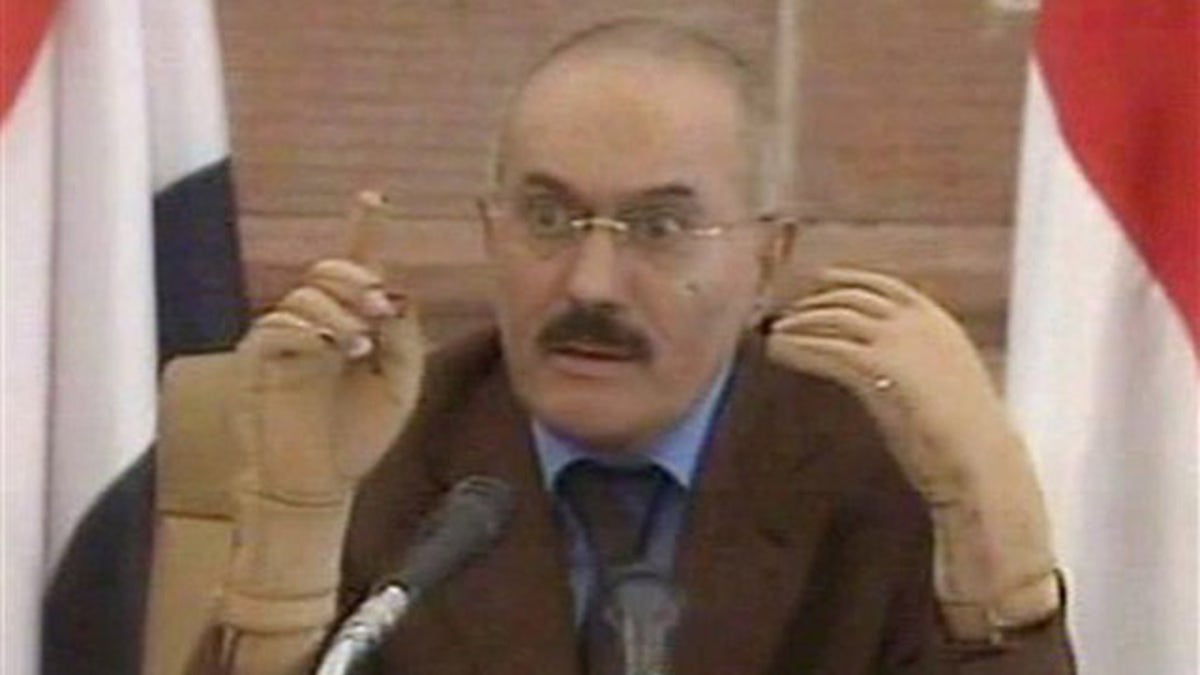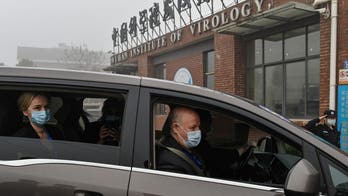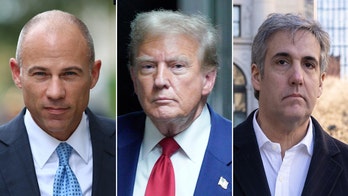
In this Oct. 8, 2011 file image made from video, Yemen's President Ali Abdullah Saleh speaks on Yemen State Television. (AP)
Yemeni President Ali Abdullah Saleh has arrived in the United States for medical treatment, Fox News confirms.
The world has been watching to see when -- indeed, if -- the embattled leader would come to the United States for treatment. He was expected to arrive in New York days earlier, but those plans were apparently delayed.
A Yemeni embassy spokesman said Saleh is in the U.S. for a short-term private medical visit.
For the past week, Saleh has been in Yemen's neighbor Oman. The U.S. State Department signed off on his U.S. visit a week ago, but some European countries have been reticent to let his plane land and refuel within their borders on its way to the United States, according to one source familiar with Saleh's travel plans. The United Kingdom ultimately approved a brief stop-over, the source said.
A spokesman for Saleh had told the Associated Press earlier Saturday that Saleh had already arrived in London and would leave later in the day for New York.
Under international pressure after a deadly crackdown on mass protests demanding his resignation, Saleh recently agreed to end his three decades of rule and hand power to Vice President Abed Rabbo Mansour Hadi.
In exchange, Saleh has been granted immunity from prosecution, a move condemned by detractors and human rights activists as a violation of international law.
"(It) sends the disgraceful message that there is no consequence for killing those who express dissent," the global organization Human Rights Watch said in a statement Monday.
Nevertheless, U.S. officials have expressed support for a "peaceful, democratic transition" in the lawless nation, particularly as presidential elections set for late February approach. Hadi, the vice president, is a leading candidate to replace Saleh.
A U.S. State Department spokeswoman said Saleh's absence in Yemen "provides some breathing space for the transition to move forward."
U.S. and Yemeni officials have insisted Saleh's visit to the United States is for the sole purpose of receiving medical attention.
He suffered serious burns and other wounds during a rocket attack on his compound in June. For three months, doctors treated him in neighboring Saudi Arabia. American officials hoped he would stay there, according to the Associated Press, but the Yemeni leader returned, igniting a new round of violence.
Now, Saleh is headed for the United States.
"This is not a political visit. This is a medical visit," State Department spokeswoman Victoria Nuland told reporters Tuesday, adding that Saleh would "enjoy some courtesies here, including security protection."
A day earlier, she said her "expectation" is "he will leave the United States when his medical treatment is complete."
U.S. officials reportedly wanted assurances Saleh would not seek asylum in the U.S. A spokesman for Yemen's embassy in Washington said earlier that Saleh would return to Yemen in February to attend his successor's swearing-in ceremony.
State Department officials traveled to Yemen earlier this week to meet with Vice President Hadi and other senior government officials.
The war-torn country is home to what U.S. officials have described as one of "the most operationally active" terrorist organizations, Al Qaeda in the Arabian Peninsula, the group behind the failed Christmas Day 2009 bombing and the October 2010 attempt to send explosives-laden packages to the United States.
In his "State of the Union" address Tuesday, President Obama said "Al Qaeda operatives" in Yemen and elsewhere "are scrambling, knowing that they can't escape the reach of the United States of America."




